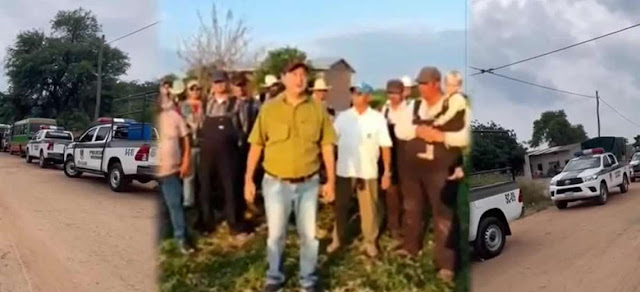The agrarian entity affirms that the colonists must move back more than 2,000 hectares because they occupy a property ceded to Iniaf and a community of which there are no records of activity. It gave 15 days for the Mennonites to vacate this space.
Contradictions arise that cast doubt on the real motives for the eviction of the Valle Verde Mennonite community, located in the locality of Quimome in the municipality of San José de Chiquitos. After describing this group as illegal and calling them foreigners, yesterday the National Institute of Agrarian Reform (INRA) assured that their settlement is legal, but that it exceeded its extension, so they will only have to move their colony to more than 2,000 hectares. In addition, it implied that the group was a victim of land trafficking and urged them to follow the corresponding legal measures.
However, the entity was categorical in stating that the community must abandon the disputed space that was granted as usufruct to the National Institute for Agricultural and Forestry Innovation (Iniaf) (860 hectares) and another part ceded to the 19 de Noviembre community with 1,400 hectares.
It is legal
In declarations to Bolivia TV, the national director of INRA, Eulogio Núñez, assured that the Mennonite colony is legal, but that it extended its limits over a fiscal property and that the solution to the conflict is to move its community.
"They simply have to move back a little bit to their colony, which is legal. What has happened is like an overflow of this colony, which suddenly also encroached on lands that were in usufruct of the Iniaf and of this community that is authorized," he remarked.
In another interview with Bolivia TV, the director of INRA in Santa Cruz, Adalberto Rojas, like Núñez, recognized that the Mennonite community is legal and that it has more than 7,000 hectares.
He assured that the eviction is from the occupied public lands and that they will not be left without land, because "nobody will take anything from them".
By means of a communiqué, yesterday the entity reiterated the measure and said that "there are pending tasks concerning inventories and removal that in a maximum period of 15 days must be concluded, according to the commitment subscribed by the occupants. These actions will be carried out under the supervision of INRA and police protection".
In addition, the entity assured that if some of the evicted Mennonites were victims of land trafficking, they must make the corresponding resignation.
"If the evicted Mennonites had been victims of land trafficking, they should go to the ordinary justice system for investigation and application of criminal sanctions, if appropriate," the entity assured in its statement.
It also assured that the 19 de Noviembre community has a Settlement Authorization Resolution issued on February 18, 2016.
However, the Mennonites' lawyer, Alejandro Altamirano, specified that INRA itself revoked this settlement.
"The same agrarian entity carried out an on-site inspection and found that the farmers did not work the land, so it totally annulled the settlement permit," he explained and maintained that
the expansion was not irregular, but in 2009 they bought the 2,000 hectare property called Guayacanes from a couple.
This couple even had documentation dating back to 1992, when Iniafa did not exist. So, he assured that the communities have all the documentation that supports the operation.
"This is a political issue and what is intended is to settle an intercultural community November 19. That is what is happening. The community has not been able to be evicted," he said.
He added that if what Núñez said was true, "the agrarian file should have been annulled". "Subsequently, the cancellation of the registry where the name of the legal representatives of the registry is registered in the Real Rights Registry should have been made".

No hay comentarios.:
Publicar un comentario